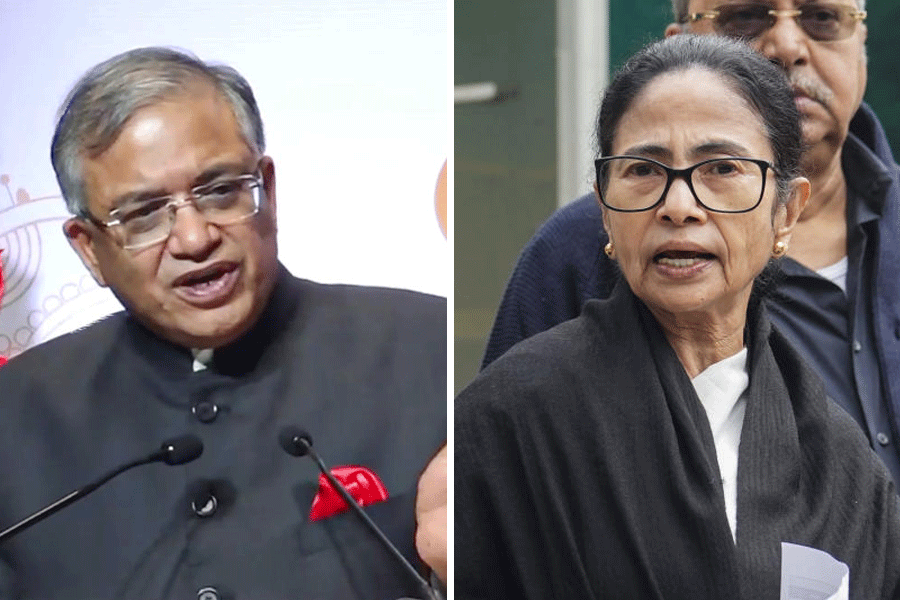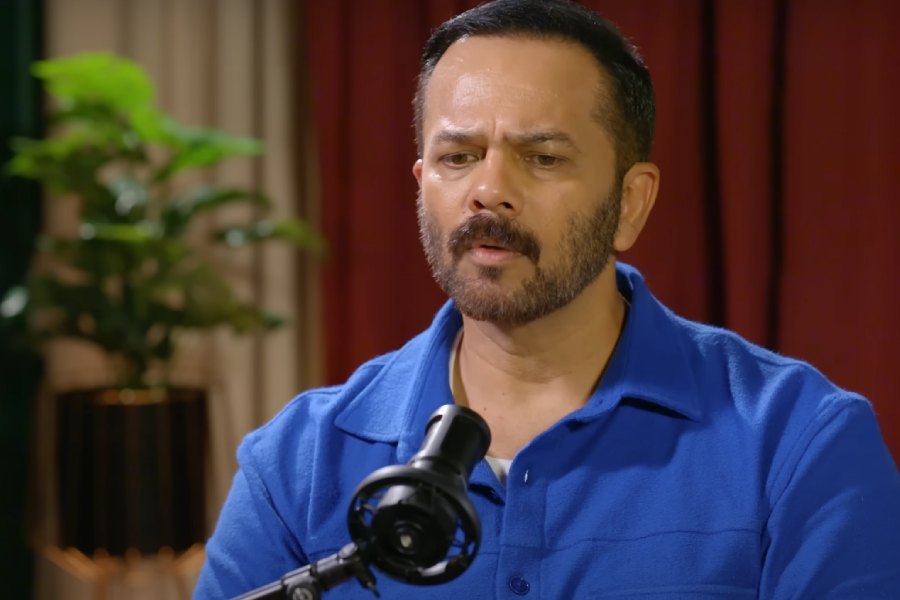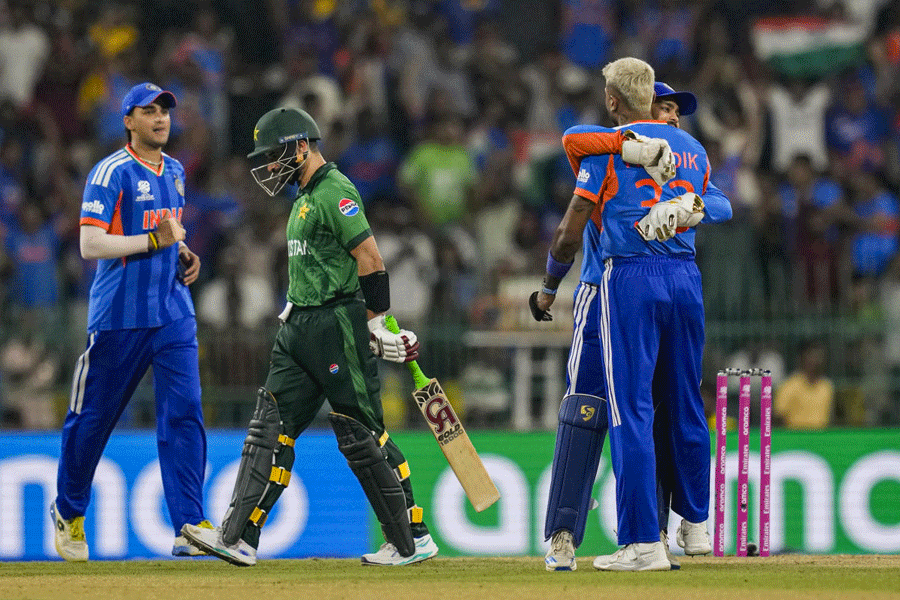 |
It was once legendary for being an open house. Jats from the home country could walk into Dharam Paaji’s huge corner residence in the leafy bylanes of Mumbai’s Juhu Ville Parle Development Scheme. Now security men guard “Dharmendra”, as the house is named, where the actor lives with his two actor sons, Sunny and Bobby Deol, and their families.
The father-sons’ second film together — Yamla Pagla Deewana — and the frenetic publicity spree occasions a rare chance to interview the usually reticent Sunny, a two-time National Award winning actor and Dharmendra’s elder son.
“Marketing is the most important thing for a film today,” says the 54-year-old, in blue jeans and a black and white bandana, on the eve of the film’s release. “I used to believe that work must speak for itself. But today you have to go out and promote your film,” he says. “Work speaks for itself but now you need manipulation along with work: I am good, I am the best.”
It’s a lesson that he believes has been much delayed. Artistic recognition from the industry bypassed his father who delivered performances in a string of hits, from the nuanced Satyakam to the comedic Chupke Chupke. The name of the new film has been taken from a hit song — Main Jat yamla pagla deewana (I am a mad Jat) — from Pratigya, a Dharmendra blockbuster of the Seventies. The popular actor never won an award during his heyday. And it still rankles with his son.
“My dad has not got his due from the industry,” Sunny remarks, sitting in the large tastefully-appointed living room on the ground floor. The interview was almost cancelled at the last minute but staying in the Outer Hebrides where Mumbai is concerned has its advantages: he (or his PR consultant) is evidently not given to starry arrogance, and the meeting is salvaged, if put on the clock.
Citing Dharmendra’s performances in films such as Anupama, Phool aur Patthar, Aankhen, Ayee Milan Ki Bela, and Naya Zamana which cut different genres, he feels his father “was the only one” to have delivered such performances. “But the awards are decided by only a small circle of insiders taking subjective decisions. It is easier to ignore us for we don’t brag or market ourselves constantly. We are very honest, blunt, pointed. I have that problem: I can’t pretend to be nice or control my anger.”
Instead, Sunny grew up motivated by his father’s films, determined to be an actor and to prove people how foolish they were in patronising the Deols. Launched by his father in Betaab in 1983, Sunny took home the National Award, special jury, for Ghayal (1990) and, a few years later, one for Supporting Actor for Damini (1993).
“I was in England undergoing treatment for a back problem when I got my first National Award. My father called me up and said, ‘Beta, you have got this award’. I said, ‘What is this award? Accha, accha.’ I never made a song and dance about it. People would say he is not a good actor, but I always had confidence that I was the best. If others say I can, I would say I can do better.”
Deol has also been a director and producer. But it is acting that he enjoys the most. “To play different characters is the most beautiful thing for me. You can’t predict success but being on a rollercoaster of characters, that’s addictive. Where else do you get to wear so many masks and display so many emotions? I couldn’t do a desk job.”
It’s a pity that Deol doesn’t speak more to the press. He is articulate, forthcoming, matter of fact, and pulls no punches. Reputed to have a fiery temper, his “dhai kilo ka haath” — one of his most famous dialogues — sits untwitching on his knee even when the muscular actor is lobbed personal questions.
“People talk about my dialogues, but I had no idea those scenes or dialogues would be so successful. I would rather do something new. I liked my performances in Betaab, Arjun, Dacait, Tridev, Paap ki Duniya, Yateem, Border, Jeet, Gaddar and Damini but I do them and move ahead. Sometimes I don’t see my films because I feel I have not achieved 100 per cent in them. But then I don’t like perfection either all the time.”
While Deol was motivated by his father’s films, he doesn’t recall a life-changing incident from his childhood years. “There is not a single incident that shapes you. That happens only in films where you have to say a story in two hours.” Instead, normal life in the Deol household was being part of a joint family, being closest to his grandparents, and strong ties with uncles and aunts. He was not buddies with his dad, but there was “tremendous love” and the “fear factor”, an old-school euphemism for respect.
With his two sons from wife Pooja, it’s the same story. “My kids have been brought up in the way I have. The times are changing now but the grassroots remain the same.”
Deol describes himself as a “a sports guy (who can) go through tough times without realising it.” He recalls being left out of the school football team, a game he loved. “It was the usual mix of teachers, politics and all that goes with being an actor’s son. I was not taken on the team.” He rustled up 11 boys and coached them from scratch, and then challenged the school team just to prove a point. “We drew one game all. How can you say I am not good?”
Active in hurdles, shot put, badminton, high jump and squash, his favourite was football. “I ran, sweated. Cricket never took on that charm for me. You wore all white, and it was all about style,” he says with a quiet smile. Confessing to being a shy guy, he acknowledges his quietude is reflected in films.
“What you are goes a little beyond the emotion of the character you are playing. I am happy and content with whatever I do. I find peace in activities away from people. I like driving, hiking, going to the mountains,” he says.
His old close-knit friends’ circle has drifted apart. “That bonding is gone. I don’t have those kinds of close friends now. I am happy with my family.”
He loves his Porsche, more as a product than as a brand. To see the country and the world go crazy over brands “really pisses me off” and he hates wastage of any kind, being careful to turn the water off while washing his hands.
His two left feet are well known but he loves music; it motivates him whether he is happy or sad. And he watches films. He raves about the newly-released The Fighter which he saw in America last month. The film is a biopic on professional boxer Micky Ward, played by Mark Wahlburg, and his relationship with his older half-brother. Would he ever act with Esha Deol, actordaughter of Dharmendra and his second wife Hema Malini?
“There are no issues. It’s all family. She is in a way my sister. If the script is interesting, I would do it,” he says calmly.
One more question in the line of duty is his rumoured link-up with actor Dimple Kapadia. “That was years ago, all those rumours. The media and gossip are part of life. I laugh about it and move ahead.”
Evidently this is a mellow Deol. Not that one should exceed one’s hospitality but one is curious to know what makes him see red. “When people think I don’t know, and take me for a ride. When they think I am stupid I pounce back. Or I get angry when someone hurts you so badly. Time heals, but I don’t like niceness being mistaken for timidity.”
The PR person is signalling that it’s time up. The publicity train for YPD has several more stops. Deol hopes to complete 50 years in the industry like his father. That’s why this film is special: it coincides with his father’s 75th birthday and his golden anniversary in films.
Would he like his father — who was elected to Parliament from Bikaner on a Bharatiya Janata Party ticket — join politics? Never, evidently. “Dad was forced into politics. Politics is against ethics of any kind. At this moment it is the best way to make loads of money. If you go against the people, the great name you have earned in your life — that gets dented. You have to either be a dictator or a slave,” he says vehemently.
One last question: what’s his idea of romance? For the first time, he smiles broadly. “I am a victim of romance. That’s my only addiction. Romance makes everything look beautiful. What could be hot and horrible becomes heaven.”
It may no longer be open house at “Dharmendra”, but there are several old unit hands and some yesteryear supporting cast in the ante room where visitors are first ushered in. They are employed there now, part of the extended family. In the room are portraits of only the patriarch. It seems to be the natural order of things in the Deol household.










